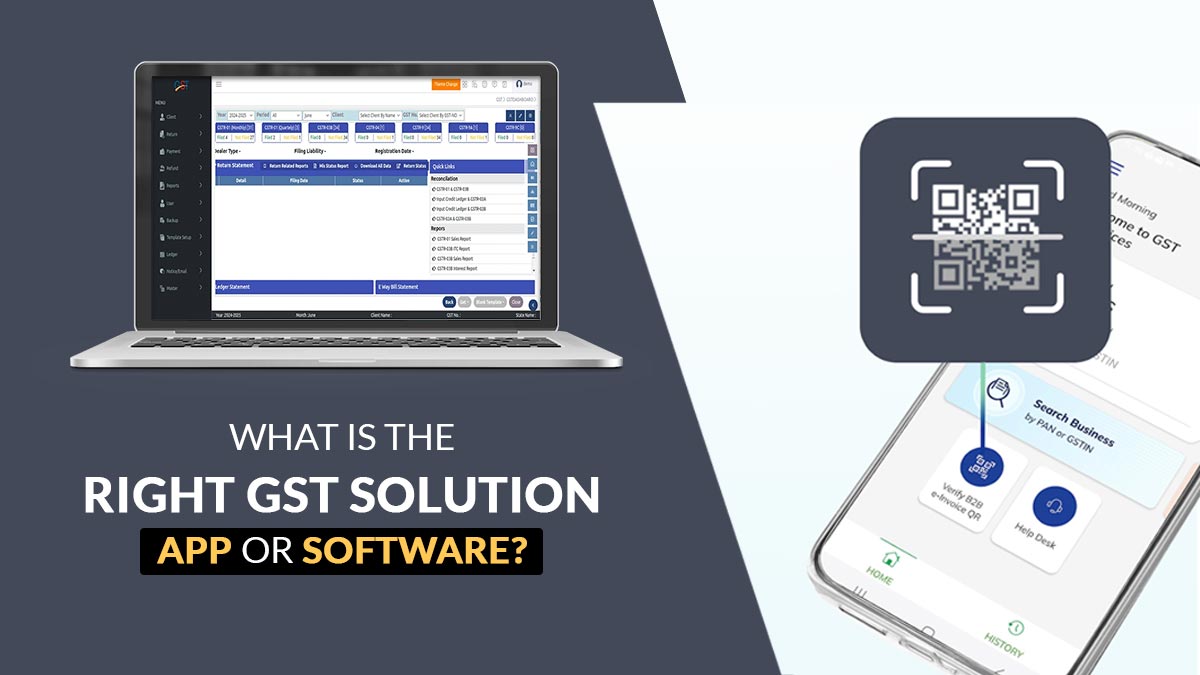
In India, complying with the Goods and Services Tax (GST) rules is crucial. Often, the norms and due dates may be revised; therefore, it is essential to select the right digital tools to manage tax-related tasks, such as filing returns and handling invoices.
Two options are there at present- GST mobile apps and online software. Both are made to make dealing with GST simpler. They secure distinct features and levels of user-friendliness, which may be appropriate for distinct businesses.
The blog discusses the comparison of GST apps and GST online software to support businesses in determining the effective either for their requirements.
Ease of Use and Accessibility
GST Apps: Mobile apps provide easy access to services. For instance, a GST app assists users in keeping track of their tax filing status, creating invoices, monitoring deadlines, and even submitting their tax returns from their smartphones. Small businesses and freelancers who work remotely can use these apps, since they permit them to handle their taxes flexibly and conveniently.
Online Software: On computers or web browsers, the GST software can normally function and has the features of a user-friendly design. Accountants and businesses doing a lot of transactions can use the same since it delivers useful visual tools and organised, distinct methods to handle data.
Verdict: Apps are more effective for fast access and mobility, and the software is ideal for complete usage and detailed compliance.
Features and Functionality
GST Apps: Creating invoices, calculating GST, filing tax returns (like GSTR-1 and GSTR-3B), and tracking the status of these returns are the essential tools that many apps provide. Due to the limitations in the screen size and storage space, more advanced features such as importing large amounts of data at once, reconciling accounts, or allowing multiple users to access the app are sometimes unavailable.
Online Software: Many specific features are being furnished by the software platforms. Businesses can upload multiple invoices at once, ensure sales and purchase records match up with tax requirements, and automatically detect mistakes under the software platform. Through the same, multiple users can connect with other accounting systems, and keep data safe with secure backups. All these functions make the software a useful resource for medium to large businesses.
Verdict: The Software proposes complete and scalable features that the apps could not provide.
Data Security and Backup
GST Apps: You can lose your data when you lose your phone or someone accesses it without permission, as it secures information that has been stored on your device when you use your apps. Some apps do authorize you to back up your information to the cloud, which is a safer option. It is not secure to save the data on your mobile device compared to other options.
Online Software: Strong security features shall be delivered from the recognised GST software to keep your financial information safe.
Verdict: For long-term business data management, Software is comparably secure and reliable.
Speed and Performance
GST Apps: Apps are straightforward and efficient tools for managing basic tasks. They are ideal for small filing needs and quick updates pertinent to GST. However, they may struggle or even crash if you attempt to use them with a large amount of information simultaneously.
Online Software: A lot of information can be managed by the Software quickly and efficiently. The reason behind it is that with computers and well-designed systems, businesses are able to file multiple tax forms, keep their records in order, and make the reports quicker than they can with the use of mobile apps.
Verdict: Software in the context of heavy workloads can function effectively.
Cost-Effectiveness
GST Apps: Many GST apps are available that do not charge a cost or secure, low subscription fees, which makes them a cheaper option for businesses and small sellers. Companies that have a lower tax filing need the same option is effective since it helps keep the costs lower.
Online Software: Various software platforms need subscription fees; however, their benefits make the same cost worth it. Such programs provide advanced features that support businesses and also include professional assistance to users. Companies that handle more and more invoices must use the software.
Verdict: Software delivers effective ROI for the larger companies, and apps are cost-effective for small businesses.
Customer Support and Updates
GST Apps: Various app-based solutions propose only basic support via frequently asked questions or email support. Updates emerge frequently they focus on fixing problems instead of adding new features.
Online Software: Useful features like reliable customer support, frequent updates, training sessions to help you learn, and alerts to keep you in line with regulations are being furnished to you when you opt for the premium GST software. Software with these features will benefit businesses that have complicated GST needs.
Verdict: An effective customer support and compliance updates will be issued by the software.
Conclusion – Which One Should You Choose?
Both mobile apps and online software have their own benefits for managing Goods and Services Tax (GST), and it depends on your business size, budget, and specific needs for choosing either specified options.
A mobile GST app for a freelancer, a small business owner, or someone just starting seems the easiest and cost-effective option. Such apps are made for quick use and are suitable for the basic GST chores.
Online GST software is good for a larger business, a small to medium-sized enterprise, or for handling a lot of invoices and team collaborations. Complex tasks are being managed under this software, and it is reliable for more significant operations.
Therefore, it is crucial to see your GST requirements before choosing to ensure that tax filing is seamless and error-free.









